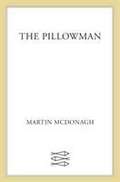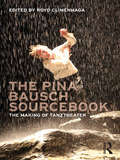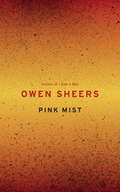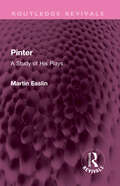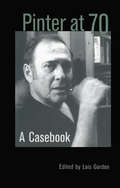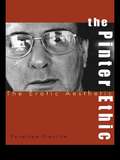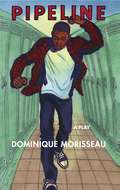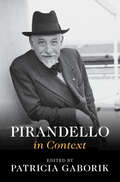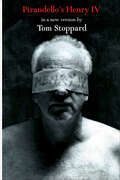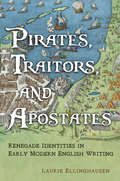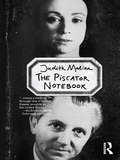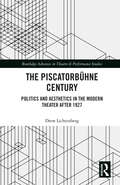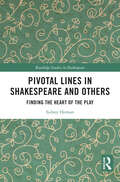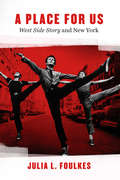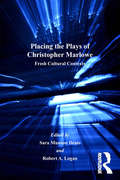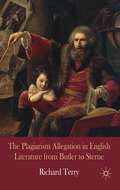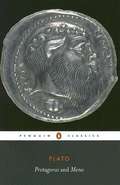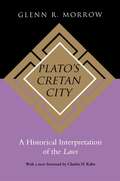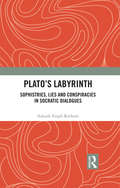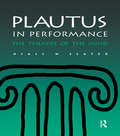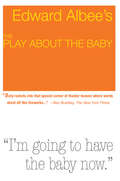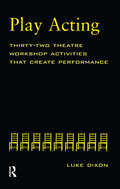- Table View
- List View
The Pillowman: A Play
by Martin McDonaghWhile still in his twenties, the Anglo-Irish playwright Martin McDonagh has filled houses in New York and London, been showered with the theatre world's most prestigious accolades, and electrified audiences with his cunningly crafted and outrageous tragicomedies. With echoes of Stoppard and Kafka, his latest drama, The Pillowman, is the viciously funny and seriously disturbing tale of a writer in an unnamed totalitarian state who is interrogated about the gruesome content of his short stories and their similarities to a number of child-murders occurring in his town.
The Pina Bausch Sourcebook: The Making of Tanztheater
by Royd ClimenhagaPina Bausch’s work has had tremendous impact across the spectrum of late twentieth-century performance practice, helping to redefine the possibilities of what both dance and theater can be. This edited collection presents a compendium of source material and contextual essays that examine Pina Bausch's history, practice and legacy, and the development of Tanztheater as a new form, with sections including: Dance and theatre roots and connections; Bausch’s developmental process; The creation of Tanztheater; Bausch’s reception; Critical perspectives. Interviews, reviews and major essays chart the evolution of Bausch’s pioneering approach and explore this evocative new mode of performance. Edited by noted Bausch scholar, Royd Climenhaga, The Pina Bausch Sourcebook aims to open up Bausch’s performative world for students, scholars, dance and theatre artists and audiences everywhere.
Pink Mist
by Owen SheersFrom the author of I Saw a Man comes a powerful drama in verse that captures both the trauma of modern warfare and the difficulty of transitioning back to normal life after combat. In early 2008, three young friends from Bristol decide to join the army and are deployed to the conflict in Afghanistan. Within a short space of time the three men return to the women in their lives—a wife, a mother, a girlfriend—all of whom must now share the psychological and physical aftershocks of military service. Written from the points of view of each soldier, Sheers explores not only their experiences in the field of battle, but also the grueling process of recovery following a debilitating injury, the strain of PTSD on a new marriage, and the emotional toll of survivor's guilt among soldiers and their loved ones at home. Drawing on interviews with soldiers and their families, Pink Mist illuminates the enduring human cost of war and its all too often devastating effect upon the young lives pulled into its orbit. A work of great dramatic power, documentary integrity, and emotional intensity.
Pinter: A Study of His Plays (Routledge Revivals)
by Martin EsslinFirst published in 1977, the third edition of Pinter is an excellent analysis of Harold Pinter and his works. Written when Pinter was only a few plays old, the book draws on several sources, including interviews with Pinter himself, to comment on Pinter’s career, his aesthetic and philosophical choices, and his oeuvre as a writer. The section devoted to his individual plays has been arranged in a chronological manner to visually represent the growth of the playwright and the relationship shared between his early and later works. Esslin, known for coining the term ‘theatre of the absurd,’ was himself an inspiration to Pinter and hence, the book records an intellectual and creative exchange between the author and his subject. The book will be of interest to students of literature, drama, history as well as to an academically inclined theatre audience.
Pinter at 70: A Casebook (Casebooks on Modern Dramatists #Vol. 30)
by Lois GordonThis comprehensive and authoritative casebook includes cornerstone essays on Pinter's creative process, his politics, film adaptations, and acting career. It also includes a collection of photos found nowhere else that document Pinter's "golden time"--his early acting days in Ireland--, a substantial introduction, a chronology, and bibliography.
The Pinter Ethic: The Erotic Aesthetic (Studies in Modern Drama #Vol. 2237)
by Penelope PrenticeFirst published in 2000. Routledge is an imprint of Taylor & Francis, an informa company.
Pipeline
by Dominique Morisseau"Pipeline confirms Dominique Morisseau's reputation as a playwright of piercing eloquence." --Ben Brantley, New York Times With profound compassion and lyricism, Morisseau brings us a powerful play that delves into the urgent issue of the "school-to-prison" pipeline that ensnares people of color. Issues of class, race, parenting, and education in America are brought to the frontlines, as we are left to question the systematic structures that ultimately trap underserved communities.
Pirandello in Context (Literature in Context)
by Patricia GaborikFor students of Luigi Pirandello's life and works, this volume provides a multi-faceted view spanning the many genres in which he wrote, from poetry and essays to fiction and drama. It gives a true sense of Pirandello's remarkable sensitivity to place – from his native Sicily to Germany and Latin America – and of how his perspective was shaped by a wide range of interlocutors with varying professional backgrounds, from contemporary philosophers to fellow playwrights like Bernard Shaw, directors like Max Reinhardt and the actress Marta Abba. Diverse contributors explore the sheer genre-bending originality of Pirandello's humor, metatheatre, and fantastic tales, and reveal how profound shifts in society, culture, and politics in his time – Freud, Futurism, Fascism – conditioned not just his thought but also his meteoric rise to fame. A final section is dedicated to Pirandello's legacy in literature and drama throughout the twentieth century and into the twenty-first.
Pirandello's Henry IV
by Luigi PirandelloThe Italian playwright&’s masterful comedy interrogating the meaning of madness is reimagined in this translation by the author of Leopoldstadt. In this meeting of two of the twentieth century&’s greatest playwrights, Tom Stoppard has reinvigorated Luigi Pirandello&’s masterpiece exploring the nature of madness and the limits of sanity. After a fall from his horse, an Italian aristocrat believes he is the obscure medieval German emperor Henry IV. After twenty years of living this royal illusion, his beloved appears with a noted psychiatrist to shock the madman back to sanity. Their efforts expose that for the past twelve years the nobleman has in fact been sane. With his mask of madness unveiled, the aristocrat launches an offensive to deflect their unwanted attention. While Pirandello&’s characters verbally spar in Stoppardian flourishes, battling for the upper hand—and the greatest laughs—one question emerges: What constitutes sanity?
Pirandello's Theatre of Living Masks
by Umberto Mariani Alice Gladstone MarianiNobel Prize-winning dramatist Luigi Pirandello is known worldwide for his innovative, complex plays. In Pirandello's Theatre of Living Masks, Umberto Mariani and Alice Gladstone Mariani offer the first new edition in nearly sixty years of six of his major works - Liola, It Is So If You Think So, Six Characters in Search of an Author, Henry IV, Each in His Own Way, and The Mountain Giants.Mariani and Mariani's translations of these texts are both vibrant and faithful to the originals, using contemporary expressions and unambiguous language to facilitate readability and comprehension. This edition also offers a critical introduction to each play's most significant characters and structures, highlighting themes and poetics as they correspond to Pirandello's entire body of work. Pirandello's Theatre of Living Masks will appeal to those already familiar with his plays and those looking to discover one of the twentieth century's great dramatists.
Pirates, Traitors, and Apostates: Renegade Identities in Early Modern English Writing
by Laurie EllinghausenExamining tales of notorious figures in Renaissance England, including the mercenary Thomas Stukeley, the Barbary corsair John Ward, and the wandering adventurers the Sherley brothers, Laurie Ellinghausen sheds new light on the construction of the early modern renegade and its depiction in English prose, poetry, and drama during a period of capitalist expansion. Unlike previous scholarship which has focused heavily on positioning rogue behaviour within the dialogue of race, gender, religion, and nationalism, Pirates, Traitors, and Apostates: Renegade Identities in Early Modern England shows how domestic issues of class and occupation exerted a major influence on representations of renegades, and heightened their appeal to the diverse audiences of early modern England. By looking at renegade tales from this perspective, Ellinghausen reveals a renegade, who, despite being stigmatized as an outsider, becomes a major profiteer during the period of early expansion, and ultimately a key figure in the creation of a national English identity.
The Piscator Notebook
by Judith Malina'Theater legend Malina has written one of the most interesting studies of the avant-garde theatrical movement published in the last several years.' – CHOICE Judith Malina and The Living Theatre have been icons of political theatre for over six decades. What few realise is that she originally studied under one of the giants of twentieth century culture, Erwin Piscator, in his Dramatic Workshop at The New School in New York. Piscator founded the Workshop after emigrating to New York, having collaborated with Brecht to create "epic theatre" in Germany. The Piscator Notebook documents Malina’s intensive and idiosyncratic training at Piscator’s school. Part diary, part theatrical treatise, this unique and inspiring volume combines: complete transcriptions of Malina’s diaries from her time as a student at the Dramatic Workshop, as well as reproductions of various of Piscator’s syllabi and teaching materials; notes on Malina’s teachers, fellow students – including Marlon Brando and Tennessee Williams – and New School productions; studies of Piscator’s process and influence, along with a new essay on the relationship between his teaching, Malina’s work with the Living Theatre and "The Ongoing Epic"; an introduction by performance pioneer, Richard Schechner. The Piscator Notebook is a compelling record of the genealogy of political theatre practice in the early 20th Century, from Europe to the US. But it is also a stunningly personal reflection on the pleasures and challenges of learning about theatre, charged with essential insights for the student and teacher, actor and director. 'Piscator is the greatest theatre man of our time.' – Bertolt Brecht
The Piscatorbühne Century: Politics and Aesthetics in the Modern Theater After 1927 (Routledge Advances in Theatre & Performance Studies)
by Drew LichtenbergThis study of the Piscatorbühne season of 1927–1928 uncovers a vital, previously neglected current of radical experiment in modern theater, a ghost in the machine of contemporary performance practices. A handful of theater seasons changed the course of 20th- and 21st-century theatre. But only the Piscatorbühne of 1927–1928 went bankrupt in less than a year. This exploration tells the story of that collapse, how it predicted the wider collapse of the late Weimar Republic, and how it relates to our own era of political polarization and economic instability. As a wider examination of Piscator’s contributions to dramaturgical and aesthetic form, The Piscatorbühne Century makes a powerful and timely case for the renewed significance of the broader epic theater tradition. Drawing on a rich archive of interwar materials, Drew Lichtenberg reconstructs this germinal nexus of theory and praxis for the modern theatre. This book will be of great interest to students and scholars in theatre, performance, art, and literature.
Pivotal Lines in Shakespeare and Others: Finding the Heart of the Play (Routledge Studies in Shakespeare)
by Sidney HomanPivotal Lines in Shakespeare and Others defines a pivotal line as "a moment in the script that serves as a pathway into the larger play … a magnet to which the rest of the play, scenes before and after, adheres." Homan offers his personal choices of such lines in five plays by Shakespeare and works by Beckett, Brecht, Pinter, Shepard, and Stoppard. Drawing on his own experience in the theatre as actor and director and on campus as a teacher and scholar, he pairs a Shakespearean play with one by a modern playwright as mirrors for each other. One reviewer calls his approach "ground-breaking." Another observes that his "experience with the particular plays he has chosen is invaluable" since it allows us to find "a wedge into such iconic texts." Academics and students alike will find this volume particularly useful in aiding their own discovery of a pivotal line or moment in the experience of reading about, watching, or performing in a play.
A Place for Us: “West Side Story” and New York
by Julia L. FoulkesFrom its Broadway debut to the Oscar-winning film to countless amateur productions, West Side Story is nothing less than an American touchstone--an updating of Shakespeare vividly realized in a rapidly changing postwar New York. That vision of postwar New York is at the heart of Julia L. Foulkes's A Place for Us. A lifelong fan of the show, Foulkes became interested in its history when she made an unexpected discovery: scenes for the iconic film version were shot on the demolition site destined to become part of the Lincoln Center redevelopment area--a crowning jewel of postwar urban renewal. Foulkes interweaves the story of the creation of the musical and film with the remaking of the Upper West Side and the larger tale of New York's postwar aspirations. Making unprecedented use of director and choreographer Jerome Robbins's revelatory papers, she shows the crucial role played by the political commitments of Robbins and his fellow gay, Jewish collaborators, Leonard Bernstein and Arthur Laurents. Their determination to evoke life in New York as it was actually lived helped give West Side Story its unshakable sense of place even as it put forward a vision of a new, vigorous, determinedly multicultural American city. Beautifully written and full of surprises for even the most dedicated West Side Story fan, A Place for Us is a revelatory new exploration of an American classic.
Placing the Plays of Christopher Marlowe: Fresh Cultural Contexts
by Sara Munson DeatsFocusing upon Marlowe the playwright as opposed to Marlowe the man, the essays in this collection position the dramatist's plays within the dramaturgical, ethical, and sociopolitical matrices of his own era. The volume also examines some of the most heated controversies of the early modern period, such as the anti-theatrical debate, the relations between parents and children, Machiavaelli¹s ideology, the legitimacy of sectarian violence, and the discourse of addiction. Some of the chapters also explore Marlowe's polysemous influence on the theater of his time and of later periods, but, most centrally, upon his more famous contemporary poet/playwright, William Shakespeare.
The Plagiarism Allegation in English Literature from Butler to Sterne
by Richard TeryContributing to the growth in plagiarism studies, this timely new book highlights the impact of the allegation of plagiarism on the working lives of some of the major writers of the period, and considers plagiarism in relation to the emergence of literary copyright and the aesthetic of originality.
Plato: Protagoras and Meno
by Plato Adam Beresford Lesley BrownPlato's finest dramatic work, an entertaining tale of goodness and knowledge Exploring the question of what exactly makes good people good, Protagoras and Meno are two of the most enjoyable and accessible of all of Plato's dialogues. Widely regarded as his finest dramatic work, the Protagoras, set during the golden age of Pericles, pits a youthful Socrates against the revered sophist Protagoras, whose brilliance and humanity make him one the most interesting and likeable of Socrates' philosophical opponents, and turns their encounter into a genuine and lively battle of minds. The Meno sees an older but ever ironic Socrates humbling a proud young aristocrat as they search for a clear understanding of what it is to be a good man, and setting out the startling idea that all human learning may be the recovery of knowledge already possessed by our immortal souls.
Plato's Cretan City: A Historical Interpretation of the Laws
by Glenn R. MorrowPlato's Cretan City is a thorough investigation into the roots of Plato's Laws and a compelling explication of his ideas on legislation and social institutions. A dialogue among three travelers, the Laws proposes a detailed plan for administering a new colony on the island of Crete. In examining this dialogue, Glenn Morrow describes the contemporary Greek institutions in Athens, Crete, and Sparta on which Plato based his model city, and explores the philosopher's proposed regulations concerning property, the family, government, and the administration of justice, education, and religion. He approaches the Laws as both a living document of reform and a philosophical inquiry into humankind's highest earthly duty.
Plato’s Labyrinth: Sophistries, Lies and Conspiracies in Socratic Dialogues
by Aakash Singh RathoreThis original and stimulating study of Plato's Socratic dialogues rereads and reinterprets Plato's writings in terms of their dialogical or dramatic form. Taking inspiration from the techniques of Umberto Eco, Jacques Derrida, and Leo Strauss, Aakash Singh Rathore presents the Socratic dialogues as labyrinthine texts replete with sophistries and lies that mask behind them important philosophical and political conspiracies. Plato's Labyrinth argues that these conspiracies and intrigues are of manifold kinds – in some, Plato is masterminding the conspiracy; in others, Socrates, or the Sophists, are the victims of the conspiracies. With supplementary forays ('intermissions') into the world of Xenophon and the Sophists, the complex and evolving series of overlapping arguments that the book lays out unfold within an edgy and dramatic narrative. Presenting innovative readings of major texts – Plato's Parmenides, Republic, Symposium and Meno as also Homer's Odyssey – this work is an ambitious attempt to synthesize philological, political, historical and philosophical research into a classical text-centred study that is at once of urgent contemporary relevance. This book aims to revitalize the study of ancient Greek thought in all its diverse disciplinary richness and will interest students and scholars across the social sciences and humanities, especially those in philosophy, Greek and classical studies, language and literature, politics, media and culture studies, theatre and performance studies, and history.
Plautus in Performance: The Theatre of the Mind (Greek And Roman Theatre Archive Ser. #Vol. 2.)
by Niall W. SlaterPlautus was Ancient Rome's greatest comic playwright, Shakespeare drew heavily on his plots, and his legacy is prevalent throughout modern drama. In this expanded edition of his successful book, one of America's foremost Classical scholars introduces performance criticism to the study of Plautus' ancient drama. In addition to the original detailed studies of six of the dramatists's plays, the methodology of performance criticism, the use of conventions, and the nature of comic heroism in Plautus, this edition includes new studies on: * the induction into the world of the play * the scripted imitation of improvisation * Plautus's comments on his previous work * the nature of 'tragicomedy'.
Play About the Baby: Trade Edition
by Edward AlbeeWinner of three Pulitzer Prizes for Drama during his long and distinguished career, Edward Albee is one of America’s preeminent playwrights. The Play About the Baby is an absurdist black comedy, reminiscent of burlesque in its high spirits and banter, that grapples with such issues as reality and the games we play to define it, the ambiguity of existence, and the agonizing bonds between parents and children. A fresh young couple—Boy and Girl—have a new baby, whom an older couple—Man and Woman—have come to steal. Why? Because, as Man says, “If you don’t have the wound of a broken heart, how can you know you’re alive?” Brutal loss—the loss of a child or childhood self—has been a recurring Albee theme, and Ben Brantley of the New York Times summed up the critical reaction to The Play About the Baby when he called it a “funny, harrowing dramatic fable … as explicit and concise a statement of what Mr. Albee believes as he is ever likely to deliver.”
Play About the Baby: Trade Edition
by Edward AlbeeWinner of three Pulitzer Prizes for Drama during his long and distinguished career, Edward Albee is one of America's preeminent playwrights. The Play About the Baby is an absurdist black comedy, reminiscent of burlesque in its high spirits and banter, that grapples with such issues as reality and the games we play to define it, the ambiguity of existence, and the agonizing bonds between parents and children. A fresh young couple--Boy and Girl--have a new baby, whom an older couple--Man and Woman--have come to steal. Why? Because, as Man says, "If you don't have the wound of a broken heart, how can you know you're alive?" Brutal loss--the loss of a child or childhood self--has been a recurring Albee theme, and Ben Brantley of the New York Times summed up the critical reaction to The Play About the Baby when he called it a "funny, harrowing dramatic fable ... as explicit and concise a statement of what Mr. Albee believes as he is ever likely to deliver."
The Play About the Baby
by Edward AlbeeThe Play About the Baby is an absurdist black comedy from one of America's premier dramatists. Reminiscent of burlesque in its high spirits and banter, the play focuses on a fresh young couple who are visited by an older man and woman, who have come to steal their child. Grappling with the agonizing bonds between parents and children, The Play About the Baby is a wicked, concise and provocative summation of the themes that have guided Albee's legendary career.
Play-Acting: A Guide to Theatre Workshops
by Luke DixonPlay-Acting is an inspired book of theatrical beginnings-jumping-off points for actors, teachers, and directors. Drawing upon his thirty years of designing and leading theater workshops, Luke Dixon goes to the heart of contemporary theater practice. Whether drawing upon Japanese butoh, Shakespearean verse, or African rhythms, these thirty-two workshops cover a wide range of activities-voice warm-ups, body work, the exploration of theatrical space, life games, dreamtime, sense and chakras, working with the spine, and much, much more. More than a collection of exercises, Play-Acting is constructed to take the user on a journey from learning about the anatomy of the individual actor's body to the performance of narrative by a group of actors. With tips on what you might expect to experience as an actor, teacher, or director, along with ideas on how to exploit the unexpected in performance, Play-Acting is a book to be read again and again.
